Artistes, organisers call for stricter measures after escalating concert disruptions

Bangladesh's live music scene, once known for its electrifying energy and passionate engagement of fans, now faces an unsettling threat: a rise in crowd violence that jeopardises not only the safety of concertgoers but also the future of live performances. Recent incidents at major concerts have forced artistes, bands, and organisers to rethink how these events are managed, as disorderly crowds increasingly breach security measures, leading to violent altercations.
According to a recent report by Ajker Patrika, artistes and organisers alike expressed concerns and speculation of a deliberate effort by coordinated groups to destabilise these events. For many, the solution is clear– identify and prosecute these individuals before the damage becomes irreversible.
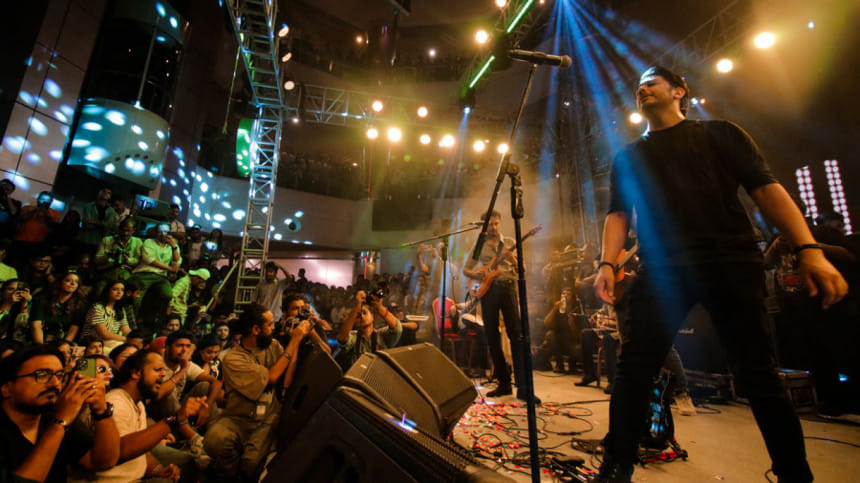
As per reports by several local media outlets, the most recent chaos unfolded at the "Save Bangladesh" concert, held on October 11 at the Hatirjheel Amphitheatre to raise funds for flood victims. Despite tight security measures, a large group of miscreants broke through the gates, causing injuries to several volunteers.
However, "Save Bangladesh" isn't an isolated case. Similar chaos erupted last month at a concert headlined by Pakistan's Jal band, where non-ticket holders attempted to force their way in, resulting in significant disorder and the concert being temporarily halted. Only the intervention of the army allowed the event to continue.
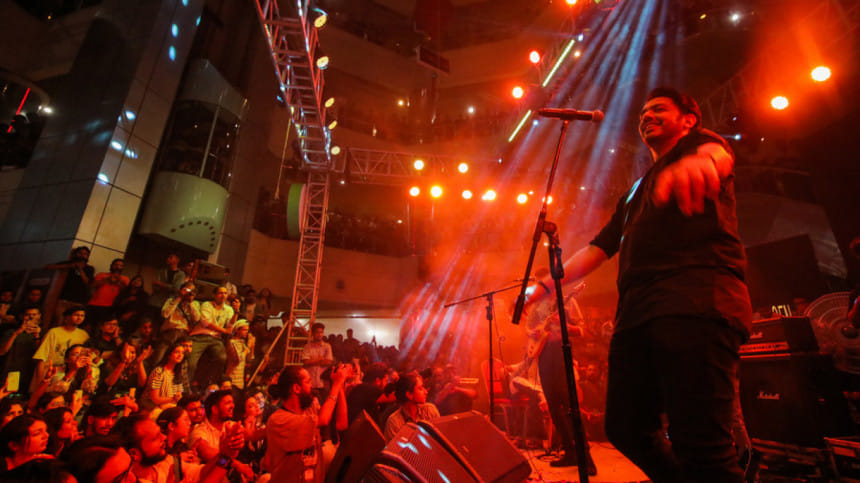
This pattern of disruption has become increasingly concerning. Even at the International Convention City Bashundhara (ICCB) in the capital, which has hosted numerous high-profile concerts, security breaches have frequently occurred.
While some lay the blame squarely on unruly attendees, others point to the disorganised nature of event management, questioning whether more could be done to prevent such incidents. Authorities, too, have come under scrutiny, with many questioning why the police and security forces have failed to maintain control at these large-scale events.
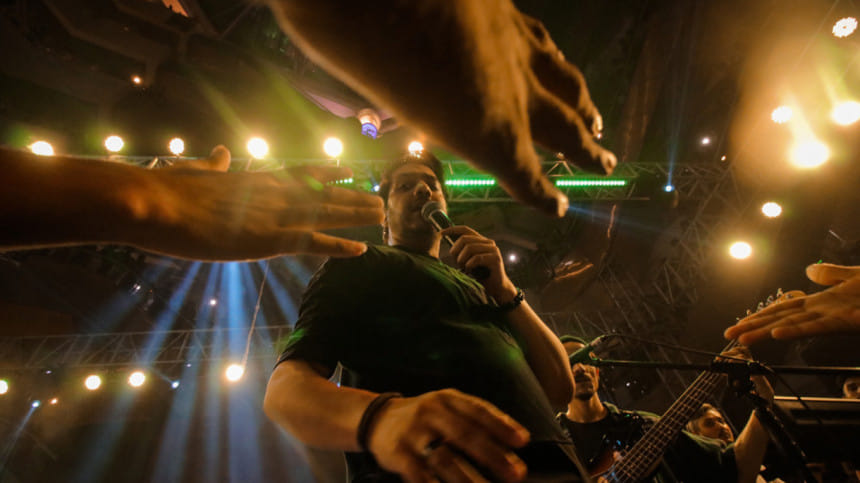
Ziaur Rahman, leader of the popular band Shironamhin, spoke out about the issue with Ajker Patrika, offering a nuanced perspective. "I don't want to place all the blame on organisers for the recent incidents. Based on my experience, organisers have made efforts—securing police permits, hiring bouncers—but there's a specific group causing this disorder. They even take pride in breaking through gates, which is alarming. If this continues, organising concerts will become difficult, and artistes and bands may be hesitant to participate," he said.
Zia's concerns are shared by many in the industry, who believe the problem lies in a combination of poor crowd management and a growing sense of entitlement among concertgoers. This disturbing behaviour, where individuals take pride in defying security measures, poses a significant risk not just to future events but to the overall culture of live music in Bangladesh.

"Some groups have already started saying that concerts should be stopped due to these disturbances," Zia continued. "That's like saying we should stop going outside because accidents might happen. Concerts are happening in other countries, aren't they? The alarming thing is, whenever we organise a significant gathering, the administration seems to fail in ensuring security."
The growing security concerns have sparked discussions about potential solutions. For Zia, the answer is twofold– increased awareness among the public and more stringent security measures from authorities. "Everyone needs to be more aware. The government must step in and ensure security. In many cases, even when the police are present for security, they fail to maintain it. They must take a stricter stance. Organisers, too, must take the matter seriously."

The sentiment was echoed in a video message by the band Nemesis, as they criticised the mentality of those trying to enter ticketed concerts for free. "People are trying to enter ticketed concerts for free. We just don't understand this mindset. It's a terrible practice. Those who buy tickets are being treated unfairly. Nothing is free in today's world. When you go to the market, do you get things for free?"
"People seem to take entertainment lightly, but it plays a huge role in our lives. Entertainment has value, and people need to recognise that. If you buy a ticket, you get to enter. If not, stay home. There are plenty of free shows. If this behaviour continues, the future of our country's music industry and artistes will be at stake."

The band Indalo took to social media to address the situation, suggesting that organised groups are actively working to sabotage live music events. "An active group is working to create destruction, disorder, and instability at concerts. We suspect several groups with different agendas are involved. For extra security, we call for an end to all free concerts. This is a serious crime, and the perpetrators should be identified, sued, and punished. They cannot be let off the hook."
Concert organisers are also feeling the pressure. Tanzim Rabbi, founder and director of the TAAN-RAAT Institute of Bangladesh and organiser of the "Save Bangladesh" concert, expressed his deep concern about the situation. "Several organising bodies have met with us, and from CCTV footage, we've identified some familiar faces involved in these disturbances. We're quite concerned about this issue."
"Artistes can significantly contribute to addressing this issue, as it is their fans who attend these concerts. By raising awareness through video messages, they could make a difference. Additionally, the administration must take responsibility, as concerts cannot proceed without police approval. However, they are currently falling short in providing sufficient security."
As the country gears up for tomorrow's "Gonojowar" concert at the Hatirjheel Amphitheatre, the organisers are determined to prevent another security breach. Farhan Fuad Utsob, founder and CEO of Mavix Global, is doubling down on safety measures, acknowledging the increased risks of hosting live events in today's environment.
"The recent trend of people breaking into concerts has worried all of us organisers. We are putting a lot of thought into security this time. We're doubling the number of volunteers and workers. Breaking into a ticketed show is a crime, and we will need help from the authorities. We've already spoken with them, and if anyone attempts this again, we will take legal action against them."
"Our concert is dedicated to everyone involved in building a new Bangladesh. If we want to shape that new Bangladesh suitably, the first step is to behave civilly," he said to Ajker Patrika.
As the situation intensifies, the question remains: can Bangladesh's live music scene survive this onslaught of disorder, or will the industry be forced to rethink its approach entirely? What's certain is that without stricter security measures and a cultural shift in how audiences value live entertainment, the future of concerts in the country could be at risk.

 For all latest news, follow The Daily Star's Google News channel.
For all latest news, follow The Daily Star's Google News channel. 
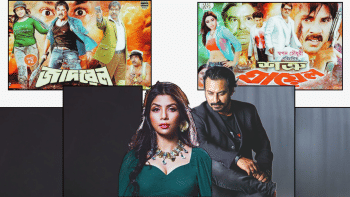
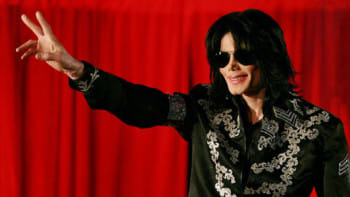






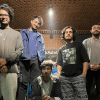


Comments